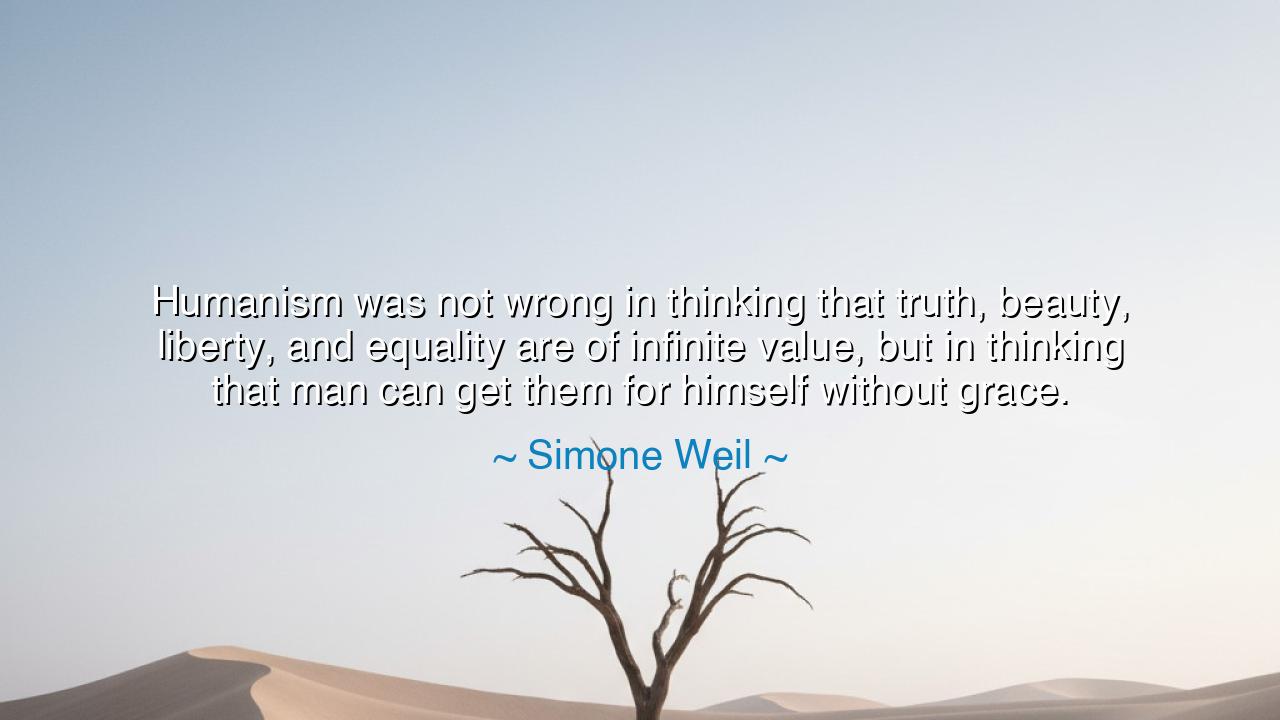
Humanism was not wrong in thinking that truth, beauty, liberty
Humanism was not wrong in thinking that truth, beauty, liberty, and equality are of infinite value, but in thinking that man can get them for himself without grace.






The words of Simone Weil, luminous and austere, strike with the solemnity of prophecy: “Humanism was not wrong in thinking that truth, beauty, liberty, and equality are of infinite value, but in thinking that man can get them for himself without grace.”
In this single sentence, Weil reveals both reverence and rebuke. She honors the vision of humanism — that noble movement which exalted the human spirit, the intellect, and the pursuit of moral perfection — yet she warns that without the divine breath of grace, all such striving turns hollow. For truth, beauty, liberty, and equality are not trophies to be seized by human hands alone; they are gifts, reflections of something greater than man, descending from beyond his will. In her eyes, to seek them apart from grace is to build a tower toward heaven, only to find that it collapses under its own pride.
Simone Weil, born in 1909 in France, was a philosopher, mystic, and revolutionary — a soul both fierce and fragile. She walked among workers, stood with the poor, and suffered alongside the oppressed. She believed deeply in justice and equality, yet her restless spirit saw the limits of human effort when severed from the eternal. Weil lived in a world scarred by war and tyranny, where human reason, once the proud banner of progress, had become an instrument of domination. The twentieth century had proved that intellect without compassion and freedom without humility lead not to paradise, but to desolation. Her words are the lament of one who saw that humanism without grace becomes its own god — and in doing so, loses its soul.
To understand her meaning, one must recall what humanism once promised. Born in the Renaissance, it was the creed of thinkers like Erasmus and Pico della Mirandola, who celebrated the dignity and potential of man. They believed that through education, art, and moral reason, humankind could ascend toward truth and build a just society. For a time, their faith bore fruit — cathedrals of thought and beauty rose across Europe, and the light of inquiry dispelled much ignorance. But in the centuries that followed, as man’s confidence grew, he began to forget the source of his own light. Reason replaced reverence, and progress replaced prayer. The sacred was dethroned, and in its place stood the human will — powerful, but unanchored.
Weil saw this error play out in history’s harshest lessons. The same age that produced the marvels of science and art also unleashed the mechanized horrors of war. The same nations that proclaimed liberty and equality enslaved others in the name of empire. In her eyes, these contradictions were not accidents but symptoms — proof that man, reaching for the infinite without grace, always falls short. For grace — that mysterious current of divine love — is what purifies human striving. It is the unseen bridge between aspiration and redemption. Without it, even the noblest virtues curdle into pride; truth becomes manipulation, beauty becomes vanity, liberty becomes chaos, and equality becomes tyranny.
Consider the story of the French Revolution, a movement born of humanity’s highest ideals — liberty, equality, fraternity. Yet when stripped of humility and grace, those ideals were consumed by the fires of the Reign of Terror. In seeking to build a paradise on earth by reason alone, men turned reason into a blade. The goddess of Liberty was enthroned in Notre-Dame, but her worship brought not peace, only blood. Weil saw in that history a mirror of all human striving without grace — the tragedy of virtue untempered by humility, of justice divorced from love. For she knew that grace is not weakness, but the strength that softens power.
Her message to us, then, is not to despise humanism, but to complete it. Truth, beauty, liberty, and equality remain infinite in worth — but we must remember that they flow from a source higher than human genius. Grace is that invisible light that reminds man he is not the measure of all things, but a vessel through which the divine may shine. To receive grace, one must cultivate humility — the openness to wonder, the quiet of the heart that listens beyond itself. The ancients called this harmony between human and divine the virtue of wisdom, knowing that the highest knowledge is not mastery, but reverence.
So, my child, take this teaching as both warning and blessing. Seek truth — but do not worship your own understanding. Pursue beauty — but let it lead you toward awe, not pride. Cherish liberty — but remember that freedom without conscience is emptiness. Strive for equality — but know that it must spring from compassion, not envy. And above all, leave room in your striving for grace, that quiet force that reconciles man to the infinite. For only with grace does human effort bear fruit that endures — fruit not born of ego, but of love.
Thus, Simone Weil’s wisdom endures like a lamp in a storm. She does not call us to abandon the dream of human greatness, but to root it once more in the divine soil from which it was born. For when truth walks with grace, and liberty kneels beside love, the human spirit rises not in rebellion against heaven, but in harmony with it — and the world, weary of its own pride, may at last remember what it means to be whole.






AAdministratorAdministrator
Welcome, honored guests. Please leave a comment, we will respond soon